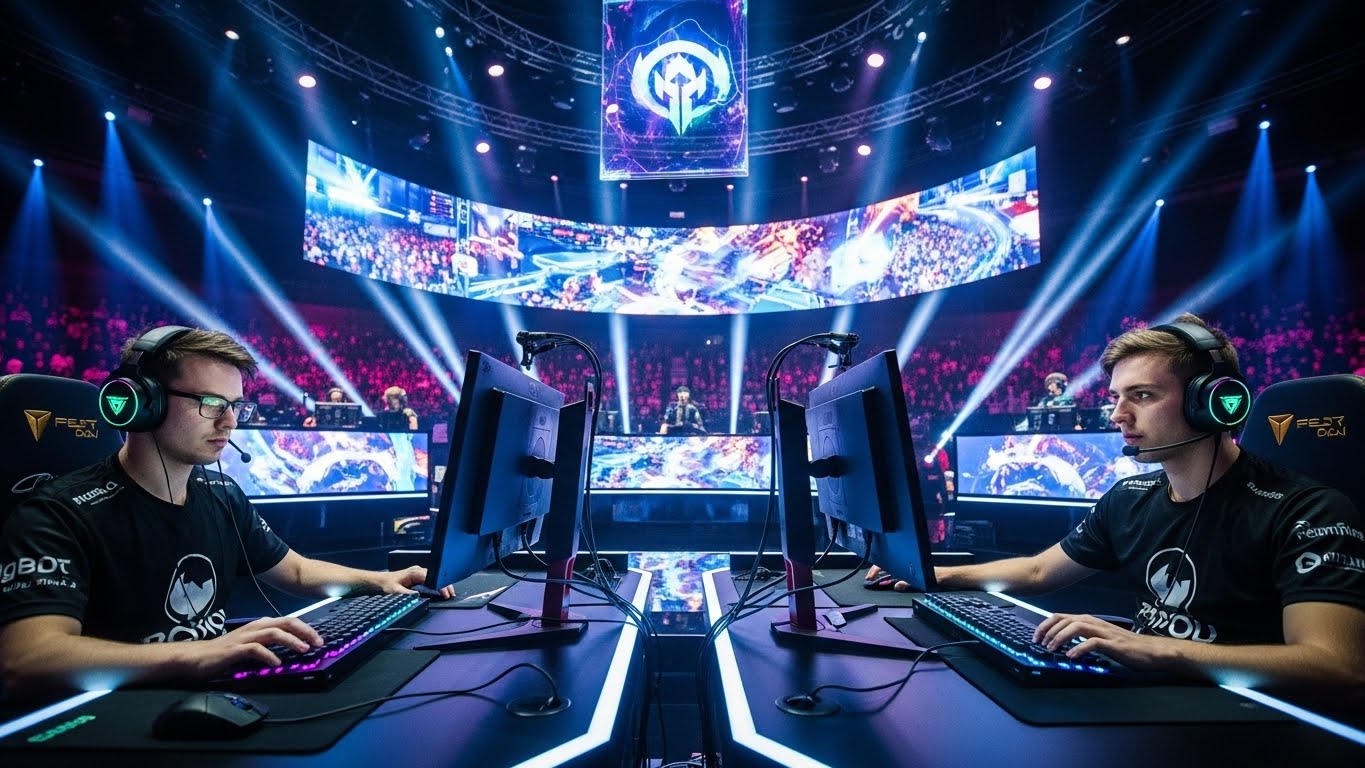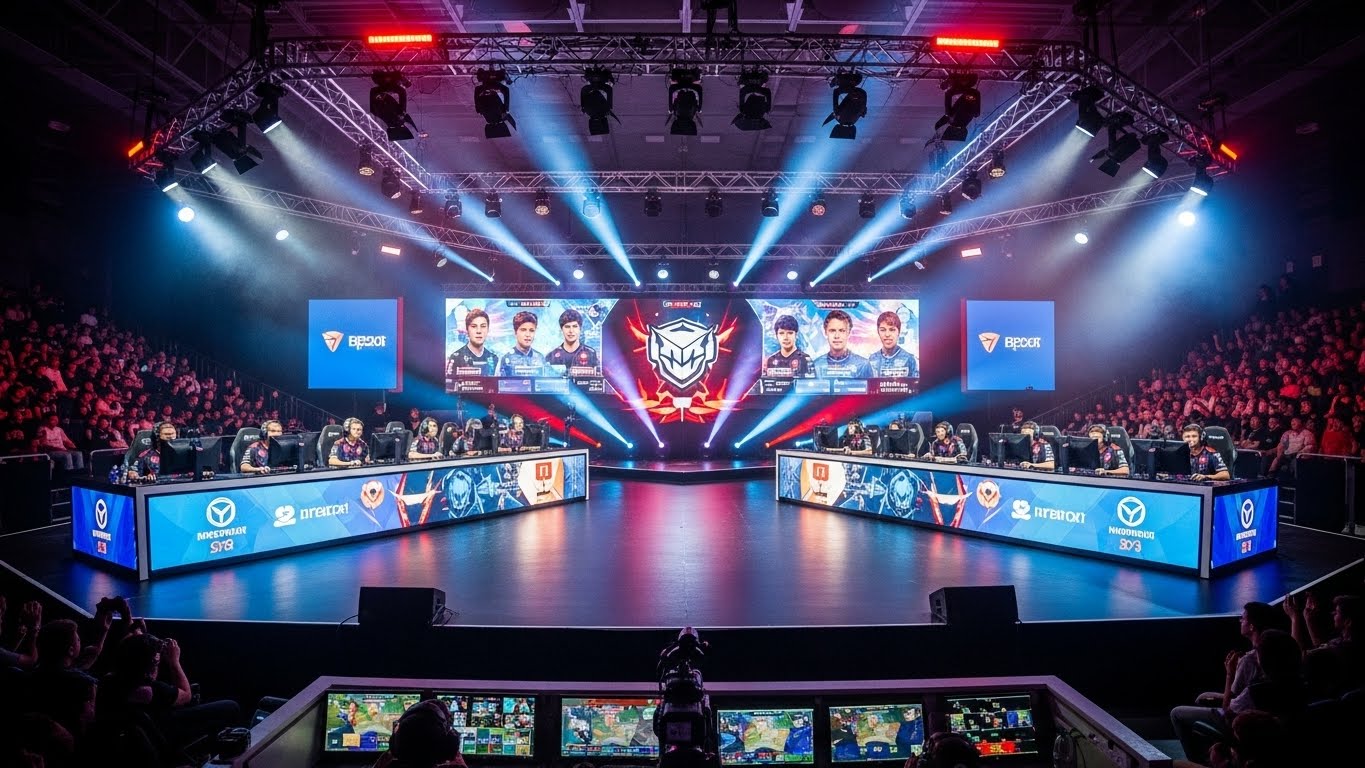Introduction: The Emergence of Esports
Esports, or competitive video gaming, has transformed from a niche hobby into a global phenomenon. What began as small tournaments in arcades and living rooms has grown into a multi-billion-dollar industry with professional teams, international competitions, and massive fan followings. The rise of esports reflects broader shifts in technology, culture, and entertainment, where gaming is no longer just a pastime—it is a legitimate form of competition, performance, and career.
Esports captivates audiences through skill, strategy, and storytelling. Fans follow players and teams with the same intensity once reserved for traditional sports, cheering for victories, celebrating individual talent, and engaging with communities online. The industry’s growth has been fueled by technological advancements, social media, and streaming platforms, allowing esports to reach millions of viewers worldwide in real time.
This blog explores the history, growth, structure, and cultural impact of esports, while examining its future and the opportunities it presents for players, fans, and the gaming industry.
The Origins of Competitive Gaming
The roots of esports trace back to the early days of video games in the 1970s and 1980s. Arcade competitions and high-score challenges allowed players to demonstrate skill and gain recognition. Games like Space Invaders and Pac-Man inspired local tournaments, creating communities around competitive play.
The 1990s saw the emergence of multiplayer games on PCs, which introduced more strategic and collaborative gameplay. Titles like Doom, Quake, and StarCraft became staples in competitive gaming, hosting early professional tournaments that drew dedicated fans. These events laid the foundation for structured competition, including league formats, prize pools, and team sponsorships.
The introduction of the internet transformed esports further. Online play enabled global competition, allowing players to challenge others without geographical limitations. LAN tournaments and online leagues began to formalize competitive gaming, setting the stage for modern esports ecosystems.
Esports as a Professional Industry
Today, esports is a highly organized and professional industry. Teams operate like traditional sports franchises, complete with coaches, analysts, marketing staff, and dedicated training facilities. Players undergo rigorous practice schedules, often training for eight to twelve hours a day to master mechanics, strategies, and teamwork.
Major esports titles like League of Legends, Dota 2, Counter-Strike: Global Offensive, and Fortnite dominate professional circuits. Each game has its own league structures, seasonal competitions, and global championships. Organizations like Riot Games, Valve, and Blizzard oversee events with standardized rules, prize pools, and broadcasting agreements.
Sponsorships and partnerships with major brands have turned esports into a lucrative business. Companies invest in teams, tournaments, and streaming platforms to reach the highly engaged gaming audience. This commercialization has professionalized the industry, providing financial stability for players and organizations while promoting global growth.
The Role of Streaming and Online Platforms
Streaming platforms like Twitch, YouTube Gaming, and Facebook Gaming have been central to esports’ popularity. These platforms allow fans to watch live matches, interact with players, and participate in community discussions. Streaming has also provided opportunities for amateur players to gain recognition, build fanbases, and transition into professional careers.
The social aspect of streaming is significant. Fans engage through live chat, follow tournaments, and share highlights on social media. Influencers and content creators contribute to esports culture, creating tutorials, commentary, and entertainment that complement professional competition. The integration of live streaming has democratized access to esports, making it a spectator-driven industry with global reach.
Major Esports Titles and Their Competitive Scenes
Several games have defined esports’ landscape, each fostering unique competitive communities and cultures.
- League of Legends: One of the most successful esports titles, League of Legends combines strategic teamwork with individual skill. Its professional scene features regional leagues and a World Championship that draws millions of viewers worldwide.
- Dota 2: Known for its complexity and deep strategy, Dota 2 is famous for The International, a championship with one of the largest prize pools in esports history.
- Counter-Strike: Global Offensive: As a tactical shooter, CS:GO emphasizes precision, teamwork, and map control. Its tournaments attract long-time fans and professional teams globally.
- Fortnite and Call of Duty: These games exemplify the shift towards fast-paced, action-oriented esports, attracting younger audiences and integrating live events with massive online viewership.
Each game has its own meta, competitive formats, and fan culture. These ecosystems provide players with career paths while offering fans diverse entertainment experiences.
The Structure of Esports Competitions
Esports tournaments are structured to showcase skill, strategy, and teamwork. Competitive formats vary from single-elimination brackets to league-based systems with seasonal matches. Teams earn rankings, qualify for playoffs, and compete for international championships.
Prize pools are a major attraction, with some events offering millions of dollars to winning teams. Crowdfunding, sponsorship, and media rights contribute to these prize funds. The high stakes create intense competition, similar to traditional sports, and motivate players to continually improve their skills.
Esports also emphasizes statistical analysis and performance tracking. Teams analyze gameplay data, strategize against opponents, and optimize individual and collective performance. This professional approach mirrors analytics-driven strategies in traditional sports.
The Culture and Community of Esports
Esports is more than competition—it is a global culture. Fans form communities around games, teams, and players. Online forums, social media groups, and fan conventions create spaces for discussion, creativity, and collaboration.
Cosplay, fan art, and memes have become integral to esports culture, reflecting the creativity and engagement of the community. Streaming personalities and influencers bridge the gap between players and audiences, creating personal connections that deepen fan loyalty.
Community engagement is also central to the growth of esports. Amateur tournaments, online leagues, and local events provide entry points for aspiring players. This inclusivity fosters a sense of belonging and encourages new generations to participate.
Esports and Traditional Sports: Parallels and Differences
Esports shares many similarities with traditional sports, including teamwork, strategy, skill, and fan engagement. Professional players train rigorously, develop tactics, and compete at high stakes. Teams have coaches, analysts, and support staff, while leagues maintain official rules and schedules.
However, esports differs in accessibility and scalability. Online platforms allow global participation, and digital formats eliminate geographical limitations. The physical demands are replaced by mental acuity, reflexes, and coordination, making esports inclusive for diverse populations. The integration of technology and media creates an interactive spectator experience unlike traditional sports.
The Economic Impact of Esports
Esports has grown into a multi-billion-dollar industry. Revenue comes from sponsorships, advertising, merchandise, ticket sales, media rights, and streaming partnerships. Major tournaments attract global attention, generating advertising and promotional opportunities for brands.
Esports also drives innovation in technology, streaming infrastructure, and digital marketing. Companies invest in hardware, software, and analytics tools to support the competitive ecosystem. Career opportunities extend beyond players to include content creators, coaches, event organizers, analysts, and marketing professionals.
This economic impact demonstrates esports’ legitimacy as a professional and cultural force, rivaling traditional sports in influence and profitability.
Challenges and Criticisms in Esports
Despite its growth, esports faces challenges. Concerns about player burnout, mental health, and physical well-being are significant. Long training hours, travel demands, and high-stress competition can affect performance and quality of life.
Additionally, the industry faces scrutiny regarding inclusivity, gender diversity, and fair competition. Efforts are underway to address these issues, including support programs for players, anti-cheating measures, and initiatives promoting women and minority participation.
The sustainability of esports also depends on adapting to changing technologies, audience preferences, and market dynamics. Continuous innovation and community engagement are essential for long-term growth.
The Future of Esports
The future of esports is expansive and full of possibilities. Virtual reality and augmented reality could redefine gameplay, creating immersive and interactive competitive experiences. Artificial intelligence may enhance training, strategy analysis, and audience engagement.
Global recognition of esports as a legitimate sport continues to grow, with some countries including it in official sporting events and educational programs. Universities offer scholarships for esports players, and professional leagues continue to expand internationally.
Esports is also influencing mainstream entertainment. Collaborations between gaming, film, music, and merchandise create cross-industry opportunities, enhancing both visibility and revenue. The integration of technology, media, and culture ensures that esports will remain a dynamic, evolving force in entertainment.
Conclusion: Esports as a Cultural and Professional Phenomenon
Esports has transformed the landscape of entertainment, bridging technology, competition, and community. It offers a platform for skill, creativity, and global engagement, uniting millions of players and fans around shared experiences.
From humble beginnings in arcades and online chat rooms to stadiums filled with thousands of fans, esports has proven that video gaming is more than a hobby—it is a legitimate cultural and professional phenomenon. The industry’s growth continues to inspire innovation, creativity, and connection.
As technology advances and the global audience expands, esports will continue to redefine competition, entertainment, and culture. It embodies the potential of digital entertainment to create shared experiences, build communities, and inspire the next generation of players and fans.
Esports is not just the future of gaming—it is the future of interactive entertainment, demonstrating the limitless possibilities when skill, passion, and technology converge.



